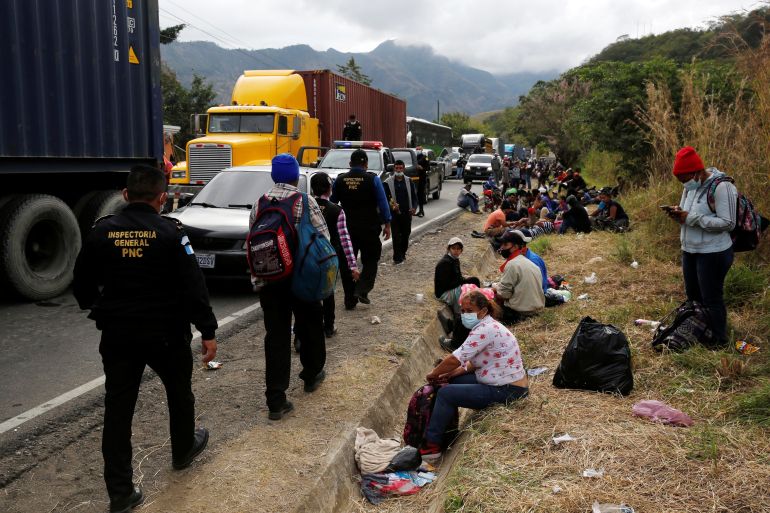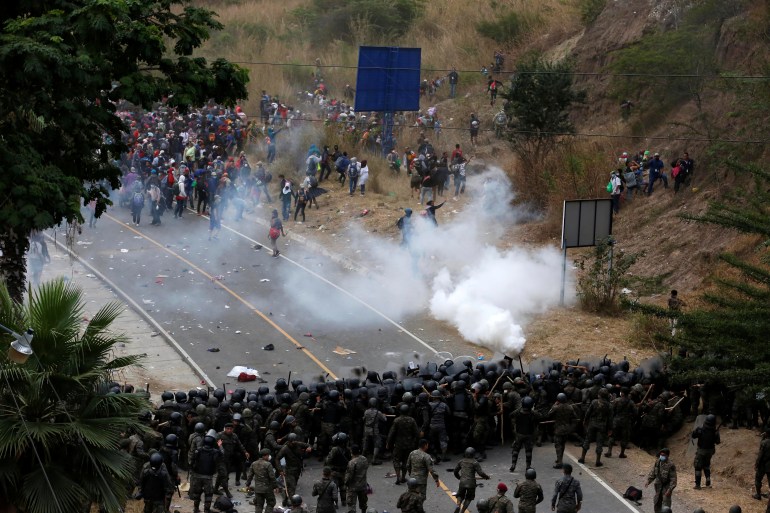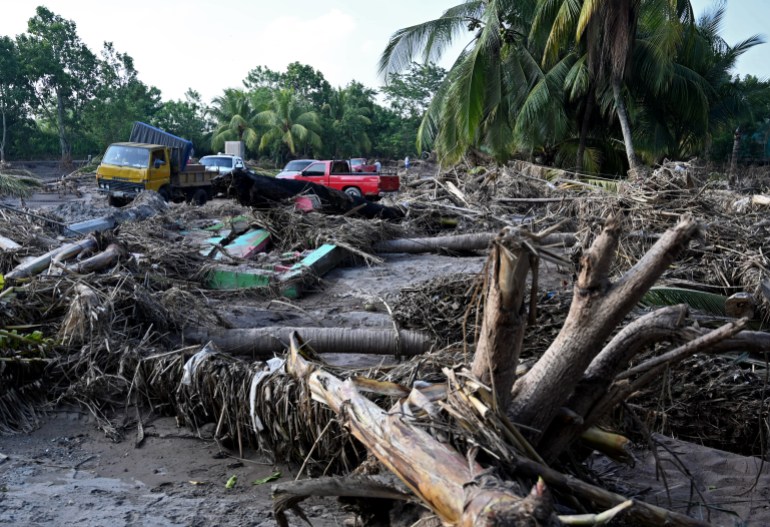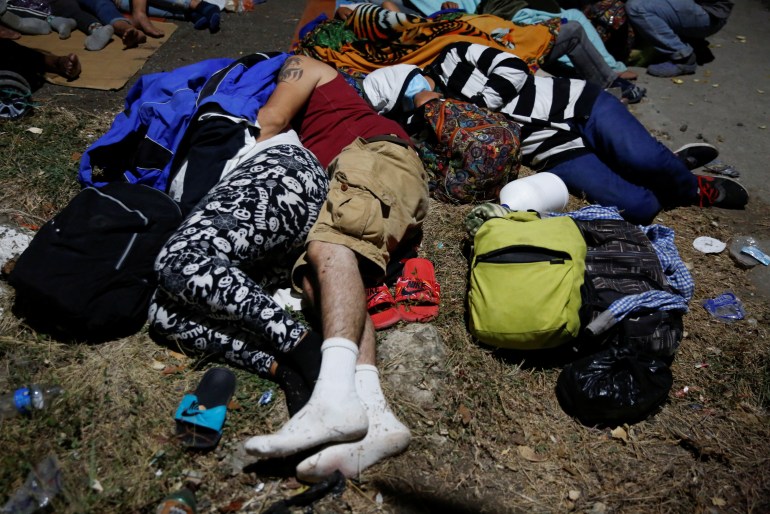Hondurans remain hopeful as Guatemala cracks down on caravan
Security forces are blocking thousands of migrants and asylum seekers fleeing hurricane destruction, unemployment and violence.

Vado Hondo, Guatemala – Guatemalan military and police forces are blocking thousands of Honduran migrants and asylum seekers hoping to make their way north to Mexico and the United States.
Thousands of Hondurans left San Pedro Sula as a group on Friday, making their way to the El Florido border crossing with Guatemala.
Keep reading
list of 3 items‘That roof over there is mine’: Guatemala’s flooded communities
Inside the disaster response network for Guatemala’s floods
Between 7,000 and 8,000 people fleeing hurricane destruction, unemployment and violence in Honduras have crossed into Guatemala to date, according to Guatemalan immigration officials.
But amid a heavy security presence, their onward journey remains precarious and uncertain.
An initial group of several thousand migrants and asylum seekers made it 27 miles (43km) on foot into Guatemalan territory before soldiers and police blocking the highway stopped them. About 3,000 people who entered Guatemala on Saturday caught up on foot by Sunday morning.

“It is sad how our sister country is treating us,” Rafael, a single father from El Progreso, a city in northwestern Honduras, who requested his last name not be used, told Al Jazeera at the blockade near Vado Hondo, roughly six miles (9.7km) south of Chiquimula in southeastern Guatemala.
Hundreds of migrants managed to push through military and police lines on Saturday, but when others unsuccessfully attempted to do so on Sunday morning, soldiers responded with batons and tear gas.
Migrants, soldiers and immigration officials suffered injuries, according to Guatemalan officials, who estimate 6,000 migrants remain on site in Vado Hondo.
Guatemalan military and police forces are blocking their advance, sometimes blocking the highway completely and at other times only letting vehicles and Guatemalans through.
Heavy security
The collective exodus this month is the latest of several migrant caravans in the past three years.
Initially, some large groups of thousands of migrants and asylum seekers made it to the US southern border, but recent caravans have been stopped by Honduras and more recently Guatemala.
Some Central Americans hope crackdowns on migration and asylum will ease up once US president-elect Joe Biden takes office. However, many analysts in the region expect US pressure on the Mexican and Central American governments to fortify their borders and block caravans will continue.
The Guatemalan government enacted emergency measures on Thursday in seven departments, restricting freedom of assembly and movement in response to the planned migrant caravan – the first of 2021.
The country also deployed about 2,000 soldiers and police officers, while Mexico has sent hundreds of troops to its southern border, 262 miles (432km) away.
Both governments have stated they will not permit “irregular” immigration and cited public health as a justification for their heavy security response. Guatemala requires negative COVID-19 test results for entry.
Devastating hurricanes
Rafael and his 13-year-old son are carrying their negative COVID-19 test results. They got tested before leaving El Progreso, but they do not have passports, which are required for the entry of minors.
“Sometimes one has to migrate to seek opportunities,” said Rafael. “Unfortunately our country is destroyed right now.”

Hurricanes Eta and Iota devastated Central America in November, and Honduras was the worst hit. Millions of people were affected by the storms, hundreds of thousands were displaced, and houses and crops were destroyed.
Several cities in northwestern Honduras suffered severe flooding, including El Progreso. Rafael’s neighbourhood is next to the Ulua River, one of the country’s largest. “We lost our house,” he said. “The homes we have now are plastic tarps.”
Rafael, his son and his seven-year-old daughter initially stayed in a shelter. After 10 days they went to check on their house, but it was still flooded. He pulled out his cell phone to show Al Jazeera a video of his son wading through thigh-deep water between the house and street.
The family then moved to an encampment under a bridge with other people displaced by the hurricanes. Thousands of people are still living in such encampments under bridges and alongside roads throughout northwestern Honduras.
“Life in Honduras is complicated,” he said, crying whenever he spoke of the daughter he left behind with relatives because she has a medical condition and would have been unable to easily travel with the caravan.

Rafael worked in Honduras, making approximately $120 a month, which was enough to feed and clothe his children when they had their own home. That was no longer the case after the hurricanes, when he would have only had roughly $20 remaining after paying rent.
“There are better opportunities in Mexico,” said Rafael, who has no plans to go to the US. He hopes to find work in Mexico to send money home for his daughter’s medical care.
‘Sometimes we eat, sometimes we do not’
Guatemalan authorities have sent back approximately 1,000 people to Honduras. Some have opted to return, while others have been forced to head back from border areas and checkpoints set up along highways in several parts of the country.
Marlen Munoz was stopped at the Vado Hondo blockade on Saturday. She sat under a canopy tent that evening, keeping watch over her sleeping children, aged six, 14, and 15.
“From Thursday when we arrived at the [San Pedro Sula bus station] until now, I have not slept,” Munoz told Al Jazeera. “The walk has been difficult.”
Prior to the COVID-19 pandemic, Munoz cleaned homes and sold beauty products to make enough to feed her family in a village roughly 44 miles (71km) south of San Pedro Sula. But she lost all her work when the government implemented strict coronavirus lockdown measures.
“I am a single mother,” said Munoz, who is hoping to reach the US. “Sometimes we eat and sometimes we do not.”
When a group of Hondurans pushed through military and police lines on Saturday, Munoz grabbed her children and ran away from the area back towards the border, fearing for her children’s safety. She said she knows they might eventually be forced to return home, but decided to wait and see, keeping an eye on the military and police presence.
“We are hoping they will let us pass,” she said.